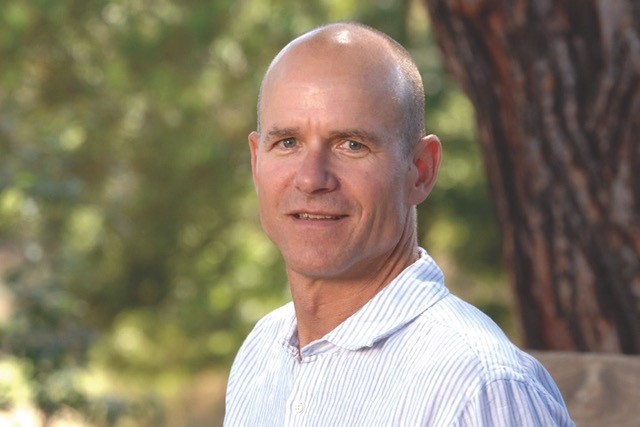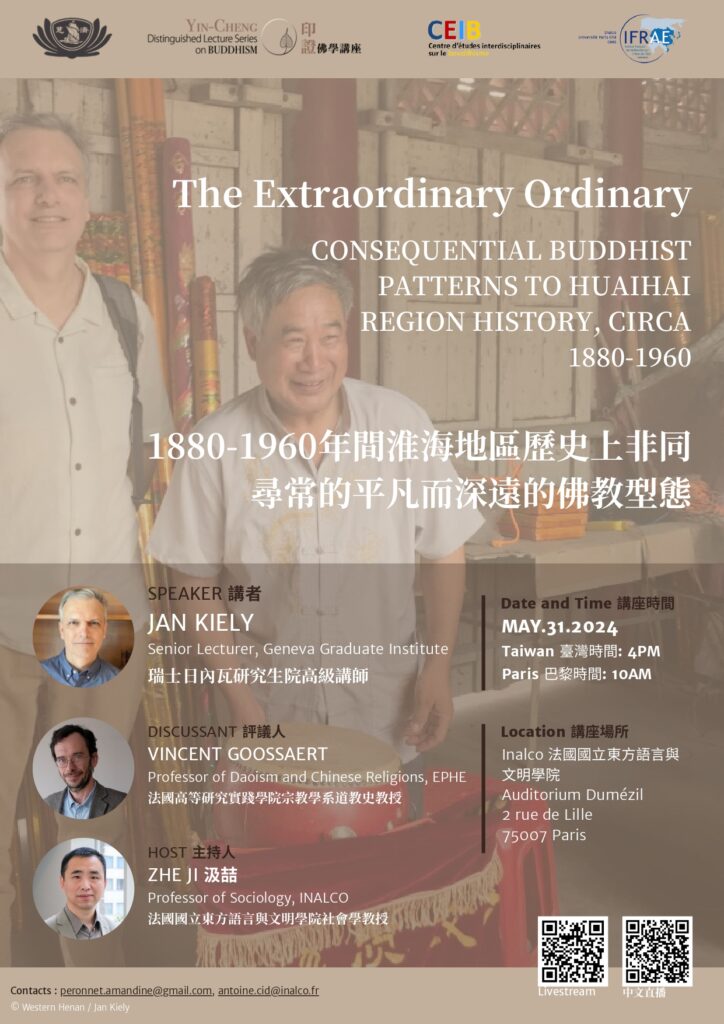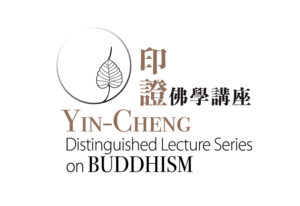Time: May 31, 4:00 pm (Taiwan) | 10:00 am (Paris)
Auditorium Dumézil, Inalco (2 rue de Lille, 75007 Paris)
The lecture will be in person and live-streamed via YouTube with simultaneous English and Mandarin channels.
Abstract:
If touching on the Buddhist network modes suggested by Welch, this paper primarily concerns patterns of discernibly Buddhist social-cultural practices, performances, and representations of consequence to local-regional histories of the end of the imperial era and the rise of the Chinese nation-state. It is not an attempt to tell a Buddhist or religious history, but recognizes, within a “six-teachings-in-one” (Buddhist-Confucian-Daoist-local religion-Wu-ist-secularist) social-culture, distinctive Chinese Buddhist elements significant to the processes and leavening dynamics of local and regional history in these turbulent times. Shifting the focus away from the well-known Jiangnan metro-area and toward its peripheral and largely abstracted northern antithesis – Jiangbei/Subei, the analysis is situated in a culturally coherent-enough subregion once known as Huaihai. Drawn mostly from non-Buddhist and non-religious sources and some fieldwork, the findings fit comfortably neither with Welch’s supposition of a predominant northern Jiangsu Buddhism nor with common postulations of a withered Buddhism, indistinct in the mélange of a “backward” culture. Many of the patterns discussed may seem hardly surprising, even ordinary. Yet, reflecting on stories of Buddhist monks, nuns, lay women and men, as well as those of people and places that might be considered even more “impure” in their relationship to Buddhism, the study detects Buddhist social-cultural resources extraordinary in their contributions to shaping and revealing historical change in this setting.
About the speaker: Jan Kiely (Geneva Graduate Institute)

Jan Kiely is Senior Lecturer in the Department of International History and Politics at the Geneva Graduate Institute. He was formerly Professor and Director of the Center for China Studies at the Chinese University of Hong Kong and Co-Director and Associate Professor at the Johns Hopkins University-Nanjing University Center for Chinese and American Studies. He is the author of The Compelling Ideal: Thought Reform and the Prison in China, 1901-1956, and of a number of articles, including studies of Buddhists in modern Chinese history. Kiely is co-editor of Modern Chinese Religion II: 1850-2015, Recovering Buddhism in Modern China, and Fieldwork in Modern Chinese History: A Research Guide, and was an editor for the journal Twentieth Century China. He received his Ph.D. in History from the University of California at Berkeley.
About the discussant: Vincent Goossaert (EPHE, PSL)

Vincent Goossaert (PhD, EPHE, Paris, 1997) is Professor of Daoism and Chinese religions at EPHE, PSL. He is co-editor of T’oung Pao, a leading journal in sinology established in 1890. His research deals with the social history of Chinese religion in late imperial and modern times, especially Daoism, religious professions, socio-religious regulations, productions of moral norms, and human-divine sociability. He has published about twenty books, including Making the Gods Speak. The Ritual Production of Revelation in Chinese History (Harvard University Asia Center, 2022), Heavenly Masters. Two Thousand Years of the Daoist State (University of Hawai’i Press & Chinese University Press, 2021), Vies des saints exorcistes. Hagiographies taoïstes, 11 e -16 e siècles (Paris, Les Belles Lettres, 2021), and Bureaucratie et salut. Devenir un dieu en Chine (Geneva, Labor et fides, 2017).
About the host: Zhe Ji (Inalco)

Ji Zhe is professor of sociology at the Institut national des langues et civilisations orientales (Inalco) and director of the Centre d’études interdisciplinaires sur le bouddhisme (CEIB) in France. His main study areas are Buddhism and the relationship between religion and politics in modern and contemporary China. His recent publications include Religion, modernité et temporalité : une sociologie du bouddhisme chan contemporain (CNRS Editions, 2016), Making Saints in Modern China (co-edited with David Ownby and Vincent Goossaert, Oxford University Press, 2017), Buddhism after Mao: Negotiations, Continuities, and Reinventions (co-edited with Gareth Fisher and André Laliberté, University of Hawai‘i Press, 2019).
About the Yin-Cheng Distinguished Lecture Series: Launched in September, 2021, the Yin-Cheng Distinguished Lecture Series (印證佛學傑出學術系列講座) is a collaborative, multi-university partnership between Peking University, University of Oxford, University of Cambridge, Inalco (Institut national des langues et civilisations orientales), Princeton University, Harvard University, and the University of British Columbia. The Lecture Series is established in honour of Venerable Cheng-yen 證嚴, founder of Tzu Chi, and her mentor Yinshun 印順 (1906–2005), with the goal of promoting topics in Buddhist Studies.
Click to download the poster












